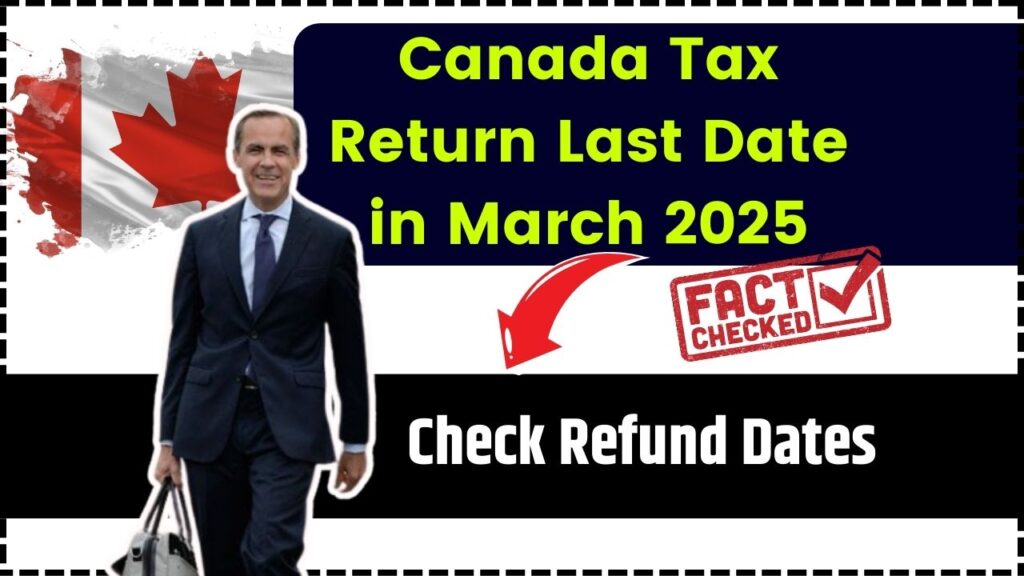
Canada Tax Return Last Date in March 2025: As the 2025 tax season approaches, it’s crucial for Canadians to be well-informed about important deadlines, refund processing times, and recent changes to the tax system. Whether you’re a seasoned taxpayer or filing for the first time, understanding these details can help ensure a smooth and stress-free experience.
Canada Tax Return Last Date in March 2025
Filing your taxes doesn’t have to be stressful. By knowing key deadlines, taking advantage of deductions, and filing early, you can ensure a smooth process. Whether you’re self-employed, a student, or filing for the first time, following these steps will help you stay compliant and possibly maximize your refund.
| Topic | Details |
|---|---|
| Filing Start Date | February 24, 2025: The Canada Revenue Agency (CRA) begins accepting tax returns. |
| Individual Filing Deadline | April 30, 2025: Deadline for most individuals to file their 2024 tax returns and pay any taxes owed. |
| Self-Employed Filing Deadline | June 15, 2025: Deadline for self-employed individuals and their spouses or common-law partners to file tax returns. Taxes owed are still due by April 30, 2025. |
| Refund Processing Times | – Electronic Filing: Refunds typically issued within two weeks. – Paper Filing: Refunds typically issued within eight weeks. |
| Late-Filing Penalties | 5% of the balance owing, plus 1% for each full month the return is late, up to 12 months. |
| CRA Contact Information | Canada Revenue Agency Contact Information |
Recent Tax Changes and Updates for 2025
Every year, the CRA introduces changes to the tax system. For 2025, key updates include:
- Increased Basic Personal Amount (BPA): The BPA, which reduces taxable income for all Canadians, has been increased to adjust for inflation.
- New or Updated Tax Credits: Changes to home renovation credits, student benefits, or climate-related incentives may apply.
- RRSP Contribution Limit Increase: The 2024 RRSP contribution limit has been adjusted, impacting 2025 tax filings.
How to File Your Canada Tax Return in March 2025: Step-by-Step Guide
1. Gather Your Documents
- T4 slips (employment income)
- T5 slips (investment income)
- RRSP contribution receipts
- Medical and child care expense receipts
- Tuition and education receipts
2. Choose a Filing Method
- NETFILE (Electronic Filing): Fastest and most secure method, with refunds processed in two weeks.
- Paper Filing: Slower but still an option, with refunds taking up to eight weeks.
- Tax Preparation Services: H&R Block, TurboTax, and professional accountants can assist with complex filings.
3. Submit Your Tax Return
- If filing online: Use CRA-certified tax software and submit via NETFILE.
- If mailing a paper return: Send it to the correct CRA processing center (addresses available on the CRA website).
4. Check Your Refund Status
- Use the CRA My Account or MyCRA Mobile App to track your refund.
- Call 1-800-959-1956 for automated refund status updates.
Common Tax Deductions and Credits You Should Claim
To maximize your refund, consider the following:
- Medical Expense Credit: Includes prescriptions, dental work, and some travel expenses for medical treatment.
- Tuition Tax Credit: For students paying tuition fees at eligible institutions.
- Child Care Expenses: Daycare, after-school programs, and babysitter costs.
- RRSP Contributions: Reduce taxable income by contributing before the deadline (March 1, 2025).
- Home Office Deduction: Available for self-employed individuals and remote workers.
What If You Owe Taxes and Can’t Pay?
If you owe taxes and cannot pay by April 30, 2025, consider the following:
- Apply for a Payment Plan: The CRA allows monthly payments under the Taxpayer Relief Program.
- Request to Waive Penalties: In cases of financial hardship, the CRA may reduce penalties.
- Avoid Further Interest Charges: Partial payments can help minimize accruing interest.
What to Do If You Are Audited?
The CRA randomly audits tax returns or selects them due to inconsistencies. If audited:
- Stay Calm: Audits are routine and not necessarily a sign of wrongdoing.
- Provide Documents Promptly: The CRA may request receipts or bank statements to verify deductions.
- Seek Professional Help: A tax accountant can assist with complex audits.
Canada Tax Refund 2025: Who’s Getting Paid in March & How to Apply
Canada’s Tax System is Changing in 2025 – These CRA Updates Will Impact You!
$750 + $890 Double CPP Payment in March 2025 – Fact Check Here, Eligibility & Payment Date
Frequently Asked Questions About Canada Tax Return Last Date in March 2025
1. What happens if I miss the April 30, 2025, deadline?
You may face a 5% penalty on any taxes owed, plus 1% per month for up to 12 months.
2. Can I file my tax return for free?
Yes! Free tax filing options include SimpleTax (now Wealthsimple Tax) and CRA’s File My Return service for eligible low-income taxpayers.
3. How long does it take to get my refund?
Electronic returns: ~2 weeks. Paper returns: ~8 weeks.
4. What should I do if I made a mistake on my tax return?
Use the CRA’s ReFILE service to make corrections online or submit a T1 Adjustment Request.
5. Are there special tax benefits for seniors?
Yes, seniors may qualify for Age Amount Tax Credit, Pension Income Splitting, and Guaranteed Income Supplement (GIS) tax breaks.







